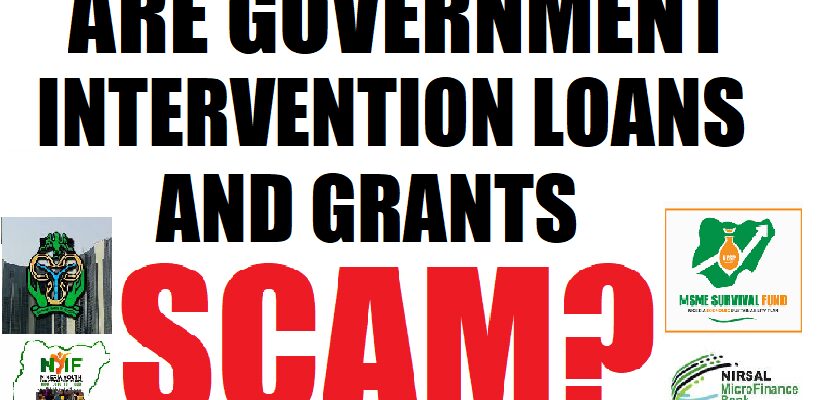It is not uncommon to see those who are yet to benefit from any existing government intervention loans or grant to doubt the veracity or existence of such programmes. Such is the case in Nigeria, where a lot of young and promising entrepreneurs continuously vent their anger on the government over what some of them described as ‘’the non-existence of interventionists programme”.
In a recent survey carried out by Naijabusiness.com.ng, we found out that there are still some qualified adults in Nigeria that are oblivious of the very numerous government intervention programmes. Some of them, especially the pessimistic once are quick to retort that such programmes to the best of their knowledge, do not exist in Nigeria.
Is Ignorance an Excuse?
There is no doubt that claims about the non-existence of intervention schemes in Nigeria are not only untrue, but malicious. From our findings, it was evident that a lot of young and qualified adults miss out on life changing intervention programmes like AGSMEIS, COVID-19 Targeted Credit Facility (TCF), MSME-BOI loans among others, due to a wide range of factors, majorly due to; ignorance and some common mistakes which will be discussed below.
Before discussing these common mistakes, it is important to remind us of the figures once again. The Central Bank of Nigeria (CBN) in its most recent communiqué No 138 of the 281st Monetary Policy Committee Meeting which was held between 16th and 17th of September, 2021, revealed that it had disbursed a total of N477.78 billion to support MSMEs across the country. The breakdown of the figure showed that it disbursed N134.57 billion to Agribusiness/Small and Medium Enterprise Investment Scheme (AGSMEIS) and N343.21 billion to its COVID-19 Targeted Credit Facility (TCF) beneficiaries.
In his exact words, the Governor of the Central Bank of Nigeria (CBN), Godwin Emefiele, said that: ‘’To support MSMEs across the country, the Bank disbursed N134.57 billion to 38,140 beneficiaries under the Agribusiness/Small and Medium Enterprise Investment Scheme (AGSMEIS), and for the Targeted Credit Facility (TCF), the sum of N343.21 billion has been released to 726,198 beneficiaries, comprising 602,730 households and 123,468 Small and Medium Enterprises.
“Under the Real Sector Facility, the Bank released the sum of N1.00 trillion to 269 real sector projects, of which 140 are in light manufacturing, 71 in agro-based industry, 47 in services and 11 in mining. Under the Healthcare Sector Intervention Facility (HSIF), N103.02 billion has been disbursed for 110 healthcare projects, of which 27 are pharmaceutical, 77 hospitals and 6 other healthcare service projects. The Bank has also disbursed a total of N145.99 billion under its Non-Oil Export Stimulation Facility(NESF). The CBN has revised the guidelines, working with Nigerian Export-Import Bank to improve access to the intervention and stimulate non-oil export growth in Nigeria.”
With the above-mentioned figures, I guess if anyone would still maintain that government intervention schemes don’t exist in Nigeria. If these schemes exist, the question is why are you not getting, even after laboriously applying? This question leads to the next part of this write-up.
Seven (7) common mistakes why your application for these intervention schemes are rejected
- Invalid or wrong contact details: Some applicants do not provide valid contact details for communication on further steps in the loan application; this forces the coordinating agency to discard the application and further consider those with up to date and relevant contact details. The contact details in this case include but not limited to; address, phone number, email, etc.
- Existing loan: Naijabusiness.com.ng observed that some candidates while applying for a new intervention scheme already have an existing loan from similar intervention scheme(s) that disqualifies them. For example, a candidate applying for the COVID-19 TCF, with an existing AGSMEIS loan, renders his application null and void. This is because an applicant cannot benefit from more than one intervention scheme at a time.
- Age: Some intervention schemes have age ceiling and minimum age for application. For example, the maximum age in applying for the Nigerian Youth Investment Fund (NYIF) is 35 years. In this regards, any applicant above the maximum age ceiling of 35 years will be automatically disqualified. Such candidates will be disqualified on the basis that they are above the age bracket for youth.
- Poor credit rating: Applicants with poor credit history such as incidences of non-performing loan is at grave disadvantage of being considered for any intervention scheme. The corresponding agency in charge of the intervention scheme would access the credit history of all the applicants and then select candidates with proven track records of performing loans, or candidates they feel will pay the loans back. You will definitely agree that no individual, agency or institution would love to grant a loan to someone with a terrible financial records or performance
- Invalid or wrong BVN: Recall that one of the most important requirements for the application of any government intervention scheme is the Biometric Verification Number (BVN). Invalid or wrong BVN that fails to match the profile of the applicants automatically disqualifies such candidates.
- Hasty or uncoordinated application: It is always advisable to start your preparation and application for these intervention loans early, as waiting for deadlines can lead to an uncoordinated, hasty or shabby applications which will be subsequently thrown out. It is pertinent to note that there is no law stating that your application should come early, nevertheless remember that ceteris paribus, the numerous application is most likely to be considered on a first come first serve basis, and beginning your application earlier gives you a leverage to go through your applications, re-read and correct them if there be any reason to do so.
- Wrong or misleading background information: Wrong or misleading information on the background of the applicants leads to an outright disqualification. It is generally expected that applicants would fill all the question with utmost sincerity and honesty.

